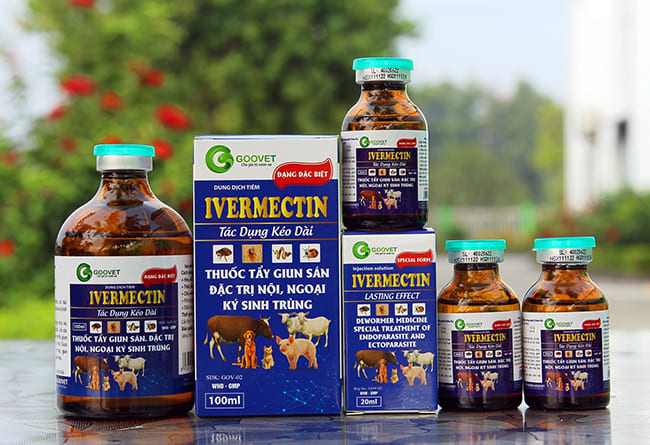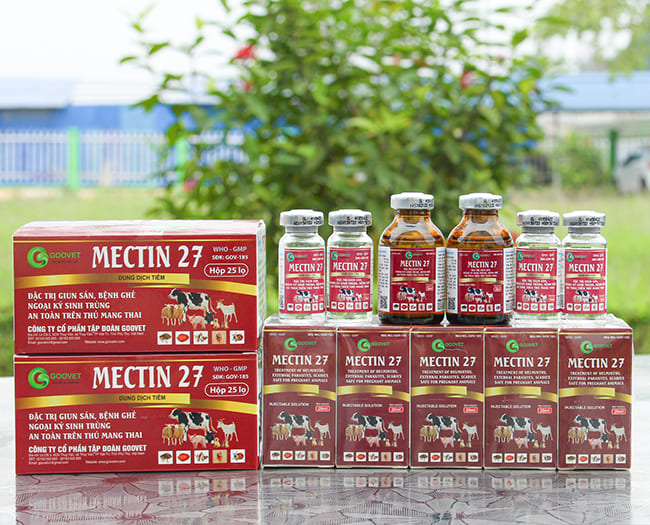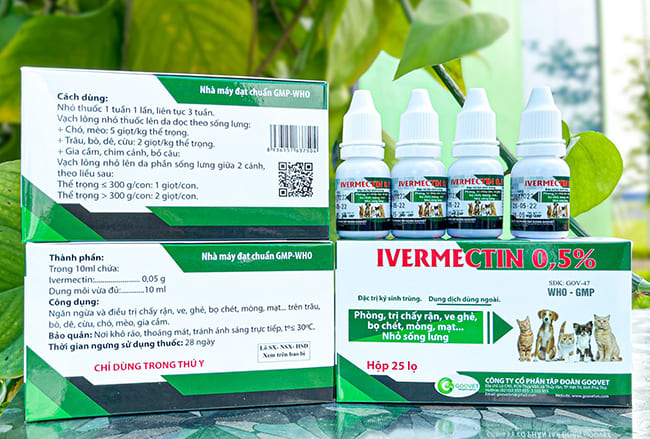Faced with the serious threat of parasitic diseases, determining the correct Ivermectin injection dose for animals becomes more crucial than ever. Understanding the Ivermectin injection dose for animals and how to use Ivermectin to achieve maximum effectiveness is not only the decisive key but also the most powerful and efficient weapon in the battle against parasites in animals. Let's explore the details in the following article with Goovet!
1. What is Ivermectin? Why is the Ivermectin injection dose for animals always required to be precise?
1.1. What is Ivermectin?
Ivermectin is an antiparasitic medication belonging to the Avermectin group. Avermectin is extracted from the fungus Streptomyces avermitilis. Through numerous studies and developments, Ivermectin is a semi-synthetic compound derived from Avermectin, continually improved to become an effective and safe antiparasitic treatment for animal use. First published in 1975, after a testing period, Ivermectin was officially utilized in 1981 and was included in the list of essential drugs by the World Health Organization (WHO). Currently, Ivermectin is a widely used and popular antiparasitic medication in the veterinary industry.
Ivermectin affects the nervous system of parasites by enhancing the transmission of nerve impulses through the release of GABA. However, it is not effective against trematode and Cestoda parasites, as they do not utilize GABA as a peripheral nervous system neurotransmitter.
Ivermectin has a broad spectrum of activity, affecting both mature and immature worms. It is effective against worms in the digestive tract, lungs, ectoparasite in livestock and poultry, ear mites, Sarcoptes mange in dogs, and is used to treat ear mites and mange in cats, etc. Safety margin is wide, making it safe for use in breeding animals and pregnant animals. Ivermectin has a long elimination half-life in most species, allowing for infrequent use while maintaining clinical effectiveness. This is also a crucial factor influencing decisions regarding the dosage of Ivermectin for different animal species.
1.2 Why is the Ivermectin injection dose for animals always required to be precise?
On the market, Ivermectin is available in various dosage forms, including injectable, topical, oral forms, etc. Therefore, specific instructions from a veterinarian, especially regarding dosage, are essential. The precision of the Ivermectin injection dose for animals is always crucial for the following important reasons:
- Treatment effectiveness: To ensure effectiveness in eliminating parasites and preventing their growth, the dosage of Ivermectin must be accurately calculated. Insufficient dosage may result in incomplete parasite eradication, leading to reduced effectiveness and prolonged treatment duration.
- Preventing drug resistance: The use of inaccurate dosage can create conditions for the development of drug resistance. When some parasites survive due to insufficient dosage, they may develop resistance to Ivermectin, reducing the effectiveness of the medication in the future. For some medications, accurate dosage helps maintain safety and sustainability in long-term use. The use of precise dosage also helps reduce the risk of drug accumulation in the environment and prevents the development of parasite resistance.
- Safety for animals: Accurate dosage ensures the safety of animals. Incorrect levels of medication may lead to undesired side effects or even pose a risk to the health of the animals.
Faced with the risks of treatment ineffectiveness, drug resistance, and increased side effects, the demand for precise dosage when injecting Ivermectin into animals becomes a crucial key in the battle against parasites, ensuring the effectiveness, safety, and sustainability of this method.
2. Dosage and Ivermectin injection dose for animals
The dosage of Ivermectin in animals depends on various factors, including the species, weight, intended use, etc. Using the correct dosage equates to ensuring precise control over parasites with minimal or no adverse effects on the health of the livestock.
2.1. Dosage and Ivermectin injection dose for dogs: Depending on the treatment purpose:
+ Heartworm preventative: 6 mcg per kg body weight (PO), monthly.
+ Heartworm treatment: 50-200 mcg per kg body weight (PO), as a single dose in the morning with toxicity monitoring (fatigue, vomiting, diarrhea, shock).
+ Ectoparasite therapy: 200-400 mcg per kg body weight (SC, PO). Repeat after 14 days.
+ Endoparasite therapy: 200-400 mcg per kg body weight (PO).
+ Sarcoptic mange treatment: 200-400 mcg per kg body weight (PO). Continuously for 7 days.
2.2. Dosage and Ivermectin injection dose for cats
+ Heartworm preventive: 24 mcg per kg body weight (PO). Continuously for 30 days.
+ Ectoparasite therapy: 200-400 mcg per kg body weight (SC, PO). Once every 7 days or as needed based on the veterinarian's diagnosis.
+ Endoparasite therapy: 200-400 mcg per kg body weight (SC, PO). Weekly.
+ Topical use (ear mite treatment): 0.5 ml/ ear (100 mcg/ml).
2.3. Dosage and Ivermectin injection dose for other animals
+ Cattle: 200 mcg kg body weight (SC, PO).
+ Pigs: 300 mcg per kg body weight, SC, PO. Administering Ivermectin to pregnant sows 4-16 days before giving birth may prevent the transmission of S. ransoni from mother to offspring through colostrum.
+ Horses: 200 mcg per kg body weight (IM, SC, PO).
+ Sheep and goats: 200 mcg per kg body weight (PO, SC).
+ Poultry: 200-300 mcg per kg body weight (SC, PO).
+ Reptiles: 200 mcg per kg body weight (PO, SC, IM). Repeat after 14 days.
3. Some considerations when using Ivermectin injection for animals
When deciding to use Ivermectin for the prevention and treatment of parasitic diseases in animals, it is important to note that consulting with a veterinarian is always necessary before initiating any treatment regimen. This ensures an accurate assessment of the animal's health status and recommendations for appropriate dosage. This is particularly important because the Ivermectin injection dose can vary depending on the type of animal, weight, and the level of parasitic infection. List the medications you are using for your animals with the veterinarian to avoid unwanted drug interactions. Only a veterinarian has the ability to provide accurate and safe guidance on the use of Ivermectin to ensure effectiveness in caring for the health of your animals.
Do not use Ivermectin in the following cases:
- Puppies under 6 weeks old or foals under 4 months old.
- Contraindicated in Collies and dairy cattle. Sensitive to sheepdogs, crossbreeds with Collies, or sheepdogs.
- Ivermectin is toxic to chelonian turtles.
- Do not inject intravenously.
- Animals are hypersensitive to Ivermectin.
Some reactions when using the medication:
- Swelling and purulent discharge reactions (pruritis at the ventral mid-line) may be observed in horses. However, these reactions can be preemptively addressed by using Glucocorticoid just before administering the medication and continuing for 1-2 days afterward.
- Some possible side effects include hypersalivation, depression, ataxia, retinopathy (difficulty with vision, mydriasis, or both can occur but will recover if the medication is stopped).
- Due to the impact of Ivermectin on heavy microfilariae infestation, itching and allergic reactions may occur as it triggers an immune response.
- In cases of overdose or if any symptoms occur, please contact your veterinarian immediately for prompt and safe intervention.
By adhering to the above guidelines, you can use Ivermectin safely and effectively in the battle against parasites in your animals.
4. Ivermectin products at Goovet.
Goovet Group Joint Stock Company - One of the leading companies in the manufacturing and sale of veterinary and aquatic medicines in Vietnam. With a commitment to providing customers with the safest and most effective products, Goovet is currently a partner with nearly 20 countries worldwide (as of the end of 2023), affirming its reputation as a trustworthy and reliable partner in the field of veterinary and aquatic medicines. Goovet's anti-parasitic treatment products come in various dosage form, meeting the diverse treatment needs for different types of animals.
Several prominent products containing Ivermectin are available at Goovet:
This injectable product has a long-acting formulation with indications for treating both ectoparasites and endoparasites in cattle, horses, goats, sheep, pigs, dogs, and cats.

Treatment of lice, scabies, fleas, ticks, mites, worms parasitizes on livestock; whipworms, hookworms, pinworms, stomach worms and lungworms, etc parasitize the gastrointestinal and respiratory tracts of cattle, pigs, goats, sheep, dogs and cats.
Injectable product, safe for pregnant animals.

The medicine is administered by apply topically on the back of cattle, goats, sheep, dogs, cats, and poultry. Use once a week, continuously for 3 weeks to prevent and treat lice, ticks, scabies, fleas, horse-flies, mites, etc.

Ivermectin, an effective 'weapon' in the treatment of parasites, brings significant benefits to animal husbandry. However, caution, strict adherence to guidelines, especially accurate administration of the Ivermectin injection dose for animals, and a clear understanding of Ivermectin are the keys to harnessing all the advantages of this 'weapon' without encountering unwanted risks. The specific Ivermectin injection dose is crucial and depends on the type of animal, weight, and the level of parasitic infection. This plays a decisive role in both the treatment process and the recovery phase after treatment.
Therefore, choosing reputable and quality medications, along with clear instructions for use and dosage, is essential to ensure the safety and effectiveness of caring for pet health and enhancing animal productivity. Alongside Goovet, we always accompany you on every journey of animal husbandry development, providing safe, efficient, modern animal husbandry solutions, along with top-quality products.
By focusing on product research and development, Goovet commits to continuously maintain and improve, enhancing the quality of products with a commitment to providing the safest and highest-quality products. For detailed information about the products, please contact the hotline at 0210.3.555.855 or Whatsapp number +84975918882 or visit the website Goovetvn.com.
